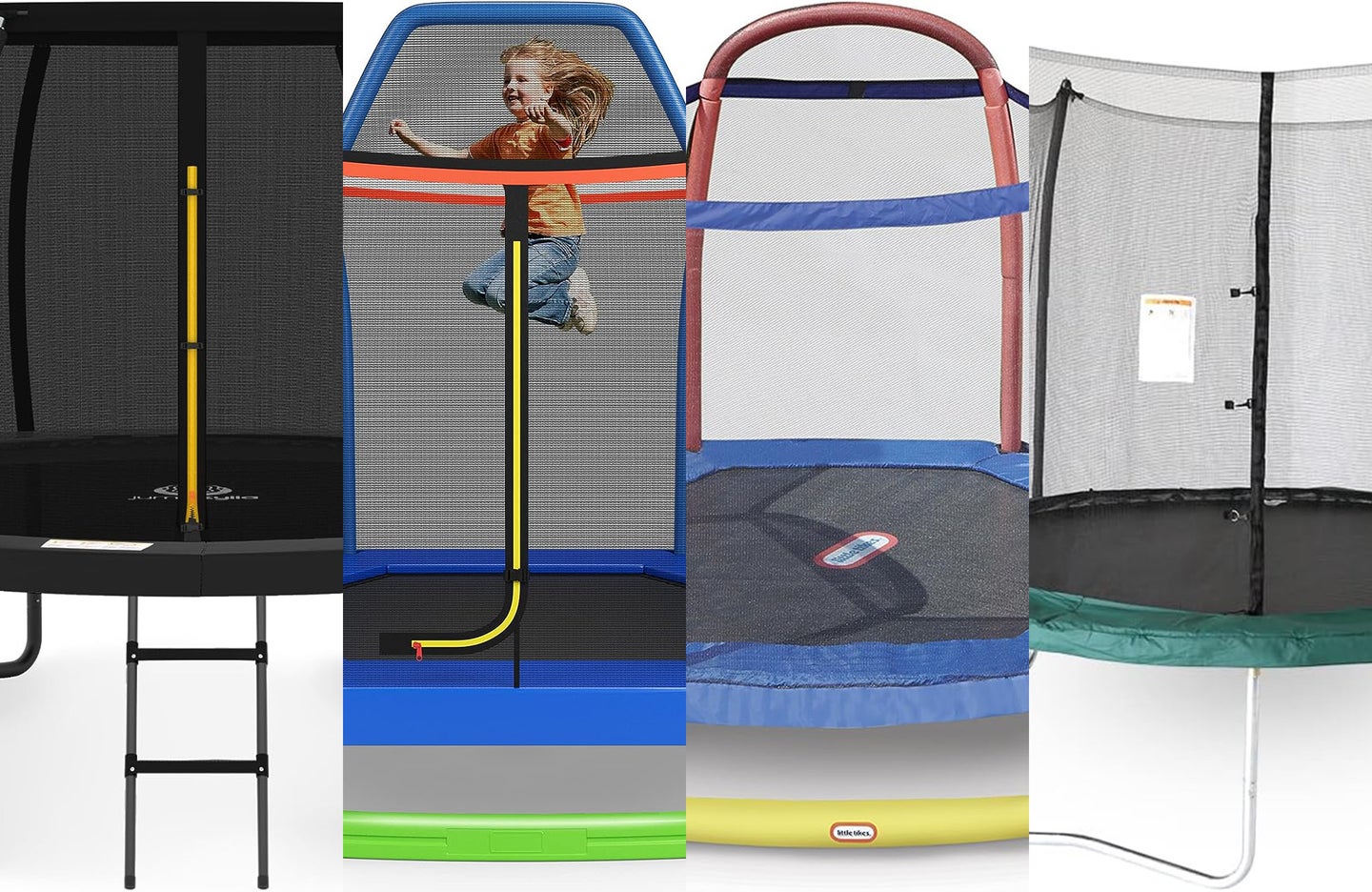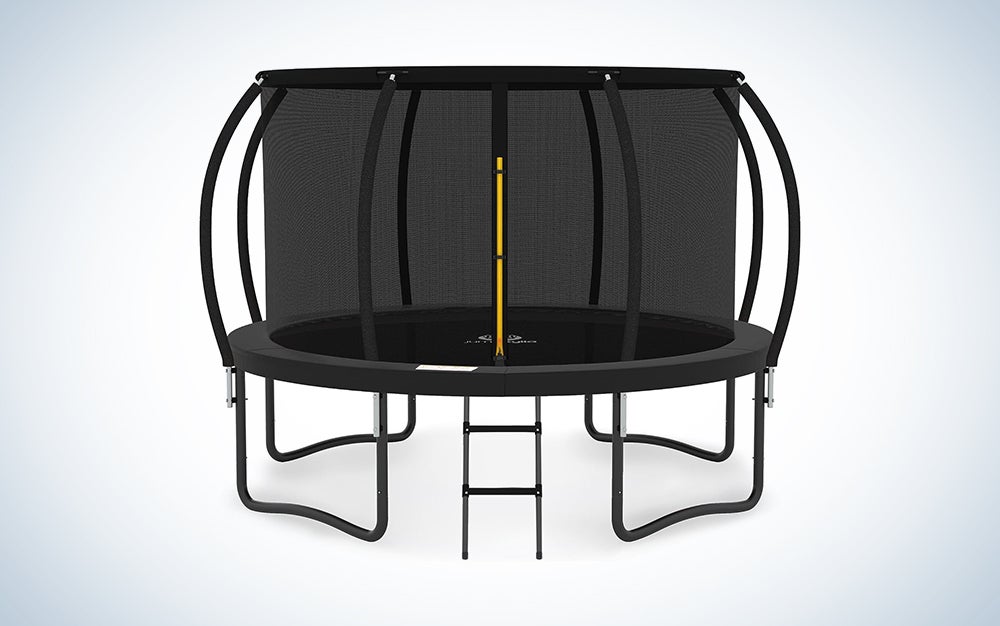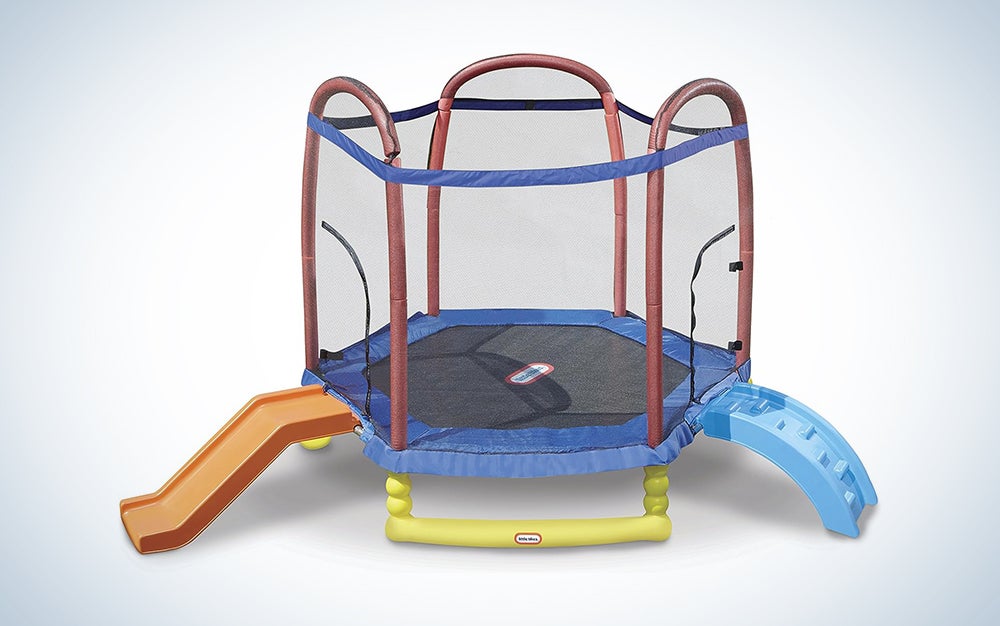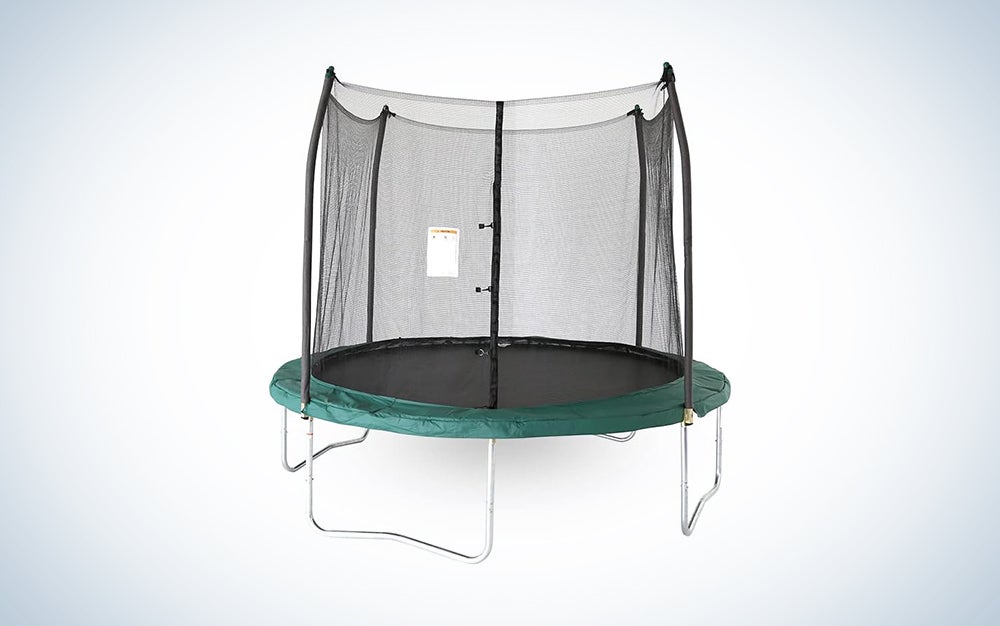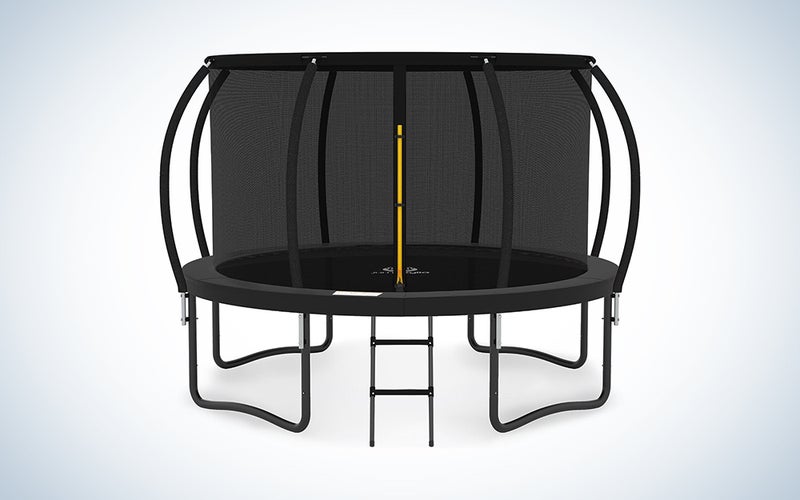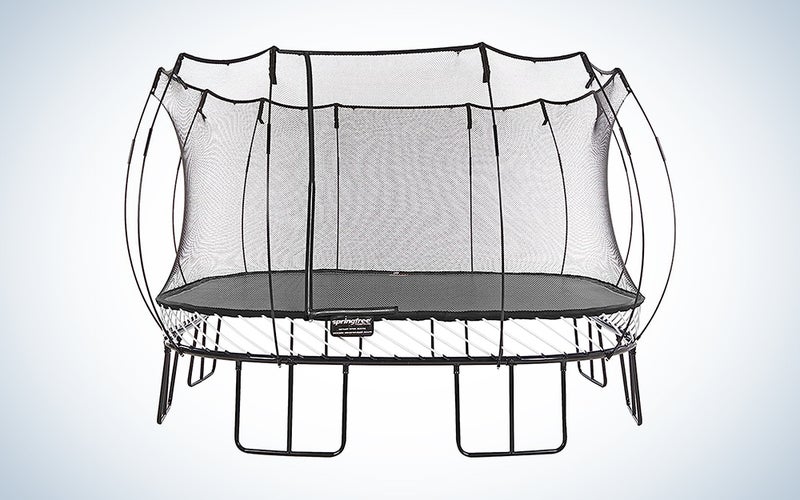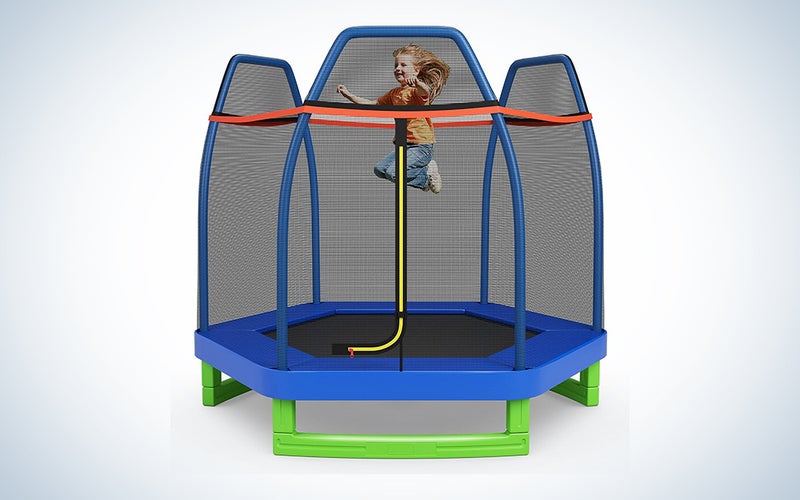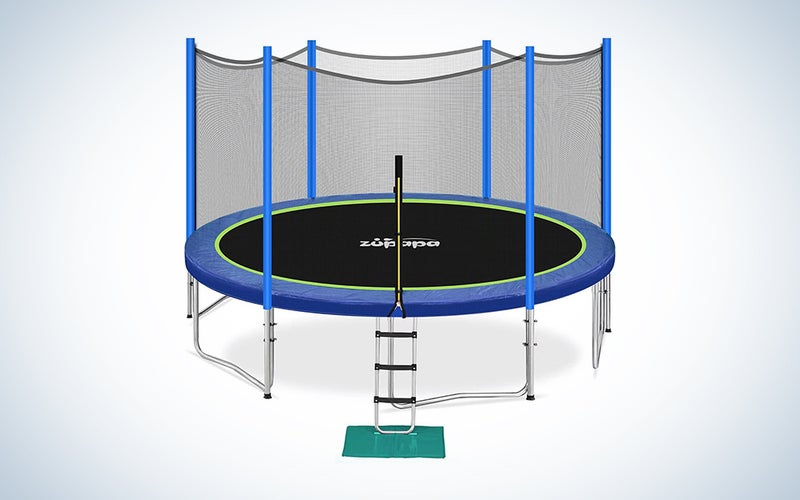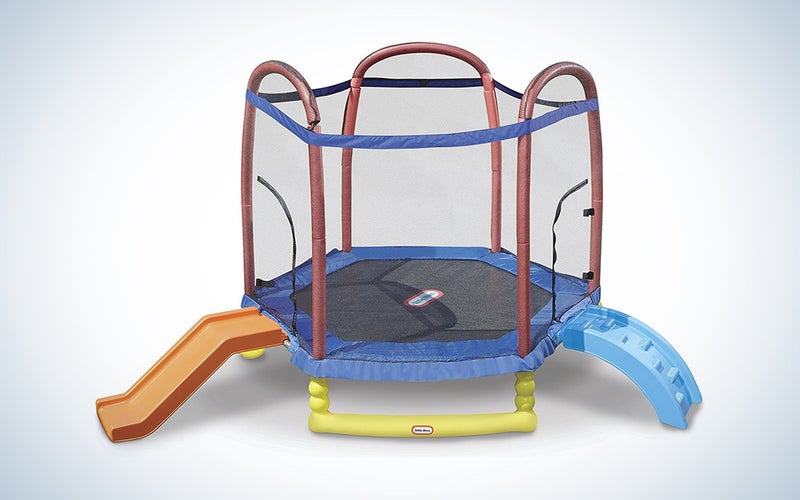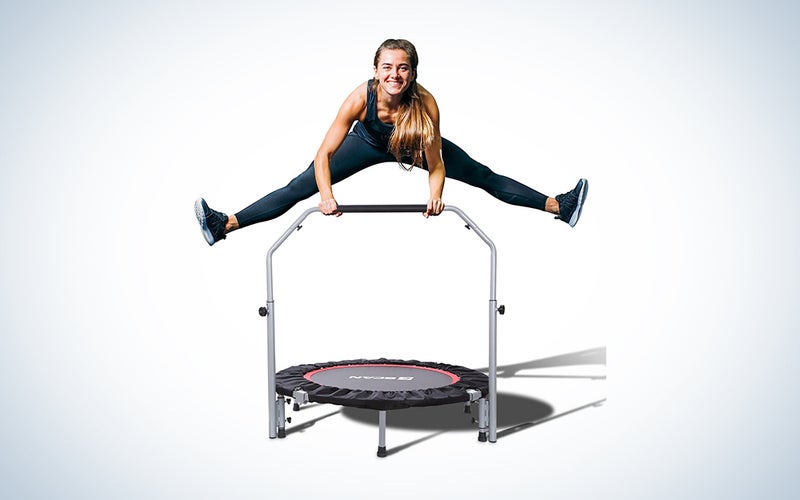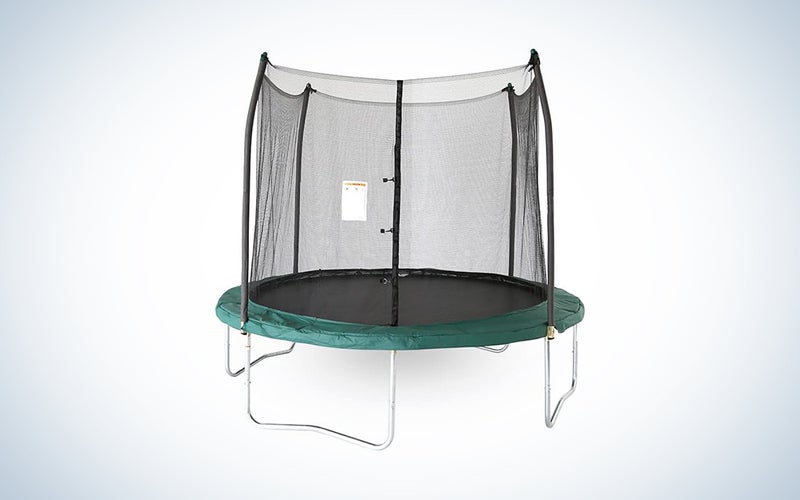We may earn revenue from the products available on this page and participate in affiliate programs. Learn more ›
Trampolines are an excellent way to get good, solid exercise that’s not boring. There’s just something about all that jumping and bouncing that makes a body feel good. Kids love them, too. If you’re tired of paying to take your kids to the trampoline park, invest in a trampoline for your yard and let them (and you) get a fun workout whenever they want. However, there’s more to selecting a trampoline than just the fun quotient. You’ll need to consider size, for one. There’s also shape, materials, and whether it has springs or not. Some even involve water. How many people—and the size of those people, i.e., is it for adults or children—should also be on your list of things to think about. Who knew trampolines could be so complicated? Thankfully, with so many options, this means the best trampoline is out there just waiting for you and your family.
- Best overall: Jumpzylla Trampoline 14FT
- Best springless: Springfree 13FT Jumbo Square Trampoline
- Best indoor: Giantex 7 Ft Trampoline for Kids
- Best for adults: Zupapa Trampoline 14FT
- Best for toddlers: Little Tikes Climb ’N Slide Trampoline
- Best for exercise: BCAN Foldable Mini Trampoline
- Best budget: Skywalker Round Trampoline 10FT
How we chose the best trampolines
When deciding on the best trampolines currently for sale, we separated them largely by target use. A trampoline for adults will differ from a kids’ or even a toddler’s trampoline. There’s also the material that provides the bounce. While most trampolines will have springs, others are springless. Trampoline location is also a factor. A trampoline meant for outside, such as a backyard, will differ from an indoor trampoline. And while any trampoline will exercise your body, some fulfill the specific function of workout trampoline.
Once we separated them into categories, we used personal experience, market consensus, and peer reviews to determine the best trampoline for each category. You can feel confident that all of the choices here represent the best of the bouncy best.
The best trampolines: Reviews & Recommendations
The best trampoline will meet your specific needs, whether for a single jumper or many, adults or children, or indoors or outdoors. Above and beyond this, though, as you’ll be using your trampoline to jump into the above and beyond, you should always keep safety in mind. Thankfully, the best trampolines are also assuredly safe, with plenty of protective measures to ensure harmless fun. Of course, outdoor-use trampolines are designed with the weather in mind and will be weather-resistant and fade-proof to boot.
Best overall: Jumpzylla Trampoline 14FT
Jumpzylla
Specs
- Dimensions: 168” L x 168” W x 103” H
- Frame: Galvanized stainless steel
- Weight capacity: 450 lbs.
Pros
- Affordable
- Powder-coated frame to resist rust
- Five colors available
Cons
- Relatively short warranty period
Jumpzylla trampolines feature a modern design with five colors to choose from. They’re also on the affordable side when compared to some of their competitors, an attractive proposition for a family looking to add a trampoline to the yard.
The 14-foot Jumpzylla trampoline, with its maximum weight capacity of 450 lbs., will provide plenty of jump size and support for kids and adults alike. Construction is sturdy, with a galvanized stainless steel frame powder-coated for rust resistance. The jumping mat is made of high-quality materials and is waterproof and UV-resistant—exactly what you want for an outdoor trampoline. Plenty of padding on the frame and springs and an enclosure net ensure your family will be safe while jumping.
Best springless: Springfree 13FT Jumbo Square Trampoline
Springfree
Specs
- Dimensions: 156” L x 156” W x 110.4” H
- Frame: Metal
- Weight capacity: 1,100 lbs.
Pros
- Unique construction ensures safety
- Extremely durable
- 10-year warranty
Cons
- Pricey
As the name suggests, Springfree offers a springless trampoline design. Flexible composite rods that sit under the frame and mat, offering support and, of course, plenty of bounce. To up the safety, a proprietary FlexiNet enclosure resistant to tearing and enclosure rods that bend as you jump prevent impact injuries. The 13-foot square model works out to the same amount of jump area as a 16-foot circular trampoline.
All this advanced trampoline technology comes at a price, though. Springfree’s trampolines are considerably more expensive than spring varieties. You do get a 10-year warranty, though, which is superb.
Best indoor: Giantex 7 Ft Trampoline for Kids
Giantex
Specs
- Dimensions: 87.6” L x 62” W x 17” H
- Frame: Galvanized steel
- Weight capacity: 220 pounds
Pros
- Indoor and outdoor use
- Sturdy U-shaped base
- Great price
Cons
- Foam on bars may come off after repeated use
Setting up a large trampoline in the backyard may just not be possible for some people. In this case, you will want a trampoline that can be used indoors. For this, we recommend Giantex’s 7 Ft Trampoline For Kids, a fantastically fun (and safe) jumper that works just as well indoors as out.
Safety is part of the design. The zippered enclosure net seamlessly meets the base, so there’s no place for children to become stuck. The poles are covered in EPE foam to reduce the chance of injury. The springs are encased in a waterproof pad, meaning there’s no chance of getting caught between springs. The jump mat is tear-resistant with plenty of bounce, and the 220 lb. weight limit means multiple children can enter the enclosure at the same time (under adult supervision, of course).
Best for adults: Zupapa Trampoline 14FT
Zupapa
Specs
- Dimensions: Unavailable
- Frame: Alloy steel
- Weight capacity: 425 pounds
Pros
- Great for adults and children
- No-gap design prevents spring injuries
- Comprehensive warranty
Cons
- Some have trouble with assembly
Sometimes, adults will want to get in on the high-jumping action. In times like this, it’s beneficial to have a trampoline that is sturdy enough to support full-size bodies. The 14-foot Zupapa trampoline is excellent for adults and big kids alike.
As of 2021, its trampolines have a no-gap design, so arms and legs can’t get caught under the safety mat that covers the spring. Frames are strong and durable, with long net poles for extra sturdiness. There’s a comprehensive warranty should something go wrong, and Zupapa gets excellent marks for its customer service. Just be sure to have a few extra pairs of hands on hand for assembly.
Best for toddlers: Little Tikes Climb ’N Slide Trampoline
Little Tikes
Specs
- Dimensions: 84” L x 84” W x 90” H
- Frame: Blow-molded plastic
- Weight capacity: 105 pounds
Pros
- Includes ladder and slide
- Durable and weather-resistant
- Easy to put together
Cons
- Outdoor only
Little Tikes has been making toys for toddlers for five decades now. You have surely seen its famous Cozy Coupe Car before—maybe you even had one yourself. Its Climb ’N Slide Trampoline lives up to the company’s reputation.
This outdoor-only trampoline is rugged and sturdy, as you’d expect from Little Tikes. It has safety foam covering all exposed metal, plus a high-quality pad protector hiding the safety springs. Two zippered entrances provide access in and out of the trampoline area, and children will love the colorful ladder and slide. Adults, on the other hand, will love how easy it is to put together.
Best for exercise: BCAN Foldable Mini Trampoline
BCAN
Specs
- Dimensions: 40” L x 40” W x 42” H/48” L x 48” W x 58.5” H
- Frame: Alloy steel
- Weight capacity: 330 pounds/440 pounds
Pros
- Now stronger alloy steel
- Adjustable handlebar
- Foldable for storage
Cons
- Springs attached to mat by fabric
All of the trampolines we’ve looked at so far are about recreation. However, BCAN’s Foldable Mini Trampoline is aimed at people wanting a rebounding trampoline for exercise. Available in two sizes, 40-inch and 48-inch (the larger has a higher weight limit), BCAN’s Foldable Mini Trampoline includes a high-quality steel frame, eight legs, and enough springs to ensure plenty of good bounce. The height of the safety handlebar is adjustable, while the mat is durable and waterproof. As the name suggests, the trampoline can be folded for easy storage, and you don’t even need to remove the pad. Make sure to stay hydrated, too.
Best budget: Skywalker Round Trampoline 10FT
Skywalker
Specs
- Dimensions: 120” L x 120” W x 110” H
- Frame: Alloy steel
- Weight capacity: 175 pounds
Pros
- Sturdy construction
- Incredible price
- Safety net has dual zippers and a latch clip
Cons
- Low weight capacity
Not everyone has a massive yard in which to set up a trampoline. For those with smaller gardens, we can’t recommend Skywalker’s 10-foot Round Trampoline enough. Best of all, it’s so affordable that you won’t have to dip into savings to give the kids a jumping good time. Despite the low cost, Skywalker’s Round Trampoline doesn’t skimp on safety features. The alloy-steel constructed frame is plenty strong, with four foam-covered angled poles that rise from the base. These add stability and hold the net, which keeps jumpers safely inside. Speaking of safety, Skywalker’s trampoline features a clever design that puts the springs outside the jump area. They’re covered with a pad for extra safety.
What to consider when buying the best trampolines
Like inflatable pools, you want to do some research before jumping into a particular option (all pun intended). Here’s what else you should look for when getting a trampoline:
Size
In the same way you would keep size in mind when buying a car or bed, you’ll want to do the same thing with a trampoline. A trampoline for a single person, such as a workout trampoline, will be much smaller than one for groups. If you have a large family (and a big yard) or plan to invite the neighborhood over for trampoline parties, a big-size trampoline—such as one 14 feet or larger—is what you want.
Weight limit
Along with size, you’ll need to keep the trampoline’s weight limit in mind. While larger trampolines will undoubtedly have higher weight limits, trampolines for adults will be more robust than ones for kids and toddlers. Before buying, check the single-jumper weight capacity and take it seriously to avoid possible future injuries. Although every trampoline will have its own weight specifications, in general, the following overall weight limits may apply:
- Mini trampolines (for toddlers): around 100 lbs.
- Rebounders (for exercise): 300-600 lbs.
- Eight-foot trampolines: 175-200 lbs.
- 10-foot trampolines: 200-250 lbs.
- 12-foot trampolines: 200-350 lbs.
- 14-foot trampolines: 200-450 lbs.
- 16-foot trampolines: 250-450 lbs.
Safety
As with any other physical activity, it’s better to be safe than sorry—this applies doubly to trampolines. Make sure that you respect the weight limit set by the manufacturer. A safety net is necessary, especially when children use the trampoline. If there’s no net, such as on an exercise trampoline, make sure there’s a handlebar to hold onto. Be sure to jump in the center of the trampoline to avoid injuries on the springs. Additional padding to cover the springs is highly recommended. If you can afford it, spring-less trampolines are an even better choice for safety.
FAQs
Q: What trampoline size should I buy?
The size of the trampoline you buy will depend on the amount of space you have for the trampoline and the age of the people who will be using it. For the first point, measure how much space you can allot to the trampoline. Pay attention to whether you can accommodate a round or rectangular trampoline. As for the second, the ideal-sized trampoline is directly related to the age of the bouncer. Toddlers up to three years of age will do best with a mini trampoline. Four to seven-year-olds will match with six-foot to 12-foot models, while older kids will need nine or 12-foot to 14-foot models. If you have large families, 14 feet or more will be satisfactory.
Q: Are rectangular trampolines better than round ones?
Rectangular models aren’t necessarily better than round ones; however, they do offer a higher bounce. No matter where you jump on a rectangular trampoline, it will give you a bounce with equal height and power.
Q: Are springless trampolines safer?
Springless trampolines offer an alternative to the standard, spring-based trampoline. Rather than have a frame around the edge, with springs attached to the interior mat, spring-less trampolines use a unique construction with the frame below the mat fabric. Because there are no springs, users can jump on the mat all the way to the edge without risk of injury. However, springless trampolines are significantly more expensive than their spring counterparts. If safety is a large concern for you, they may be worth looking into.
Q: Are in-ground trampolines better?
There are pros and cons for in-ground models. Pros include that they are more attractive in your yard and are better for children because they can’t get their fingers caught as easily, can’t get stuck underneath, and don’t have as far to fall should they topple off. Cons are that they are pricier and a hassle to move once installed.
Q: How do I prepare my yard for a trampoline?
Prepare your yard for a trampoline by ensuring you have the right amount of space. In order to do that, measure your yard and ensure there are at least three to four feet on each side of where you plan to place it. Ensure all brush and trees have been cleared, and find a spot within your yard that’s level.
Q: How do I get more bounce out of my trampoline?
Once you have a trampoline, you may want to hack it to get even more altitude from your bounces. While safety should be your first concern, if you really do want to increase your jump height, there are a number of things you can try. First, older trampolines will gradually lose their bounce as springs become worn down, rusty, stretched out, or even broken. Try replacing your springs to restore your trampoline to its former glory. If you still want more bounce to the ounce, you can try altering the spring pattern, criss-crossing them in X or V patterns. Be aware that this may cause the springs to wear down faster, though. You can also try adding more springs or changing the springs out for heavy-duty ones.
Q: How long should a trampoline last?
Trampolines generally last between three to eight years, depending on the frequency of use. As with many other things, regular maintenance can help extend the life of your bouncy friend. Replacing rusty, stretched, and broken springs will bring the bounce back to your trampoline. Don’t forget to keep an eye on the mat and frames as well.
Final thoughts on the best trampolines
- Best overall: Jumpzylla Trampoline 14FT
- Best springless: Springfree 13FT Jumbo Square Trampoline
- Best indoor: Giantex 7 Ft Trampoline for Kids
- Best for adults: Zupapa Trampoline 14FT
- Best for toddlers: Little Tikes Climb ’N Slide Trampoline
- Best for exercise: BCAN Foldable Mini Trampoline
- Best budget: Skywalker Round Trampoline 10FT
Finding the right trampoline for you or your family can significantly improve your quality of life. It’s a great, full-body workout and—assuming your trampoline is big enough—something the whole family can do together. By following the mantra of safety first and choosing a trampoline that is appropriate for the age of the jumpers as well as the size of the area available, you’re sure to find one that is perfect for your situation. Happy jumping.
Why trust us
Popular Science started writing about technology more than 150 years ago. There was no such thing as “gadget writing” when we published our first issue in 1872, but if there was, our mission to demystify the world of innovation for everyday readers means we would have been all over it. Here in the present, PopSci is fully committed to helping readers navigate the increasingly intimidating array of devices on the market right now.
Our writers and editors have combined decades of experience covering and reviewing consumer electronics. We each have our own obsessive specialties—from high-end audio to video games to cameras and beyond—but when we’re reviewing devices outside of our immediate wheelhouses, we do our best to seek out trustworthy voices and opinions to help guide people to the very best recommendations. We know we don’t know everything, but we’re excited to live through the analysis paralysis that internet shopping can spur so readers don’t have to.
